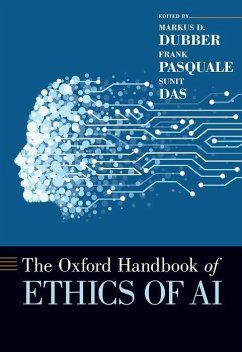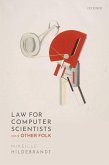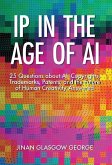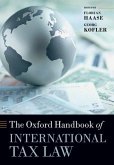The Oxford Handbook of Ethics of AI
Herausgeber: Dubber, Markus D; Das, Sunit; Pasquale, Frank
The Oxford Handbook of Ethics of AI
Herausgeber: Dubber, Markus D; Das, Sunit; Pasquale, Frank
- Gebundenes Buch
- Merkliste
- Auf die Merkliste
- Bewerten Bewerten
- Teilen
- Produkt teilen
- Produkterinnerung
- Produkterinnerung
This interdisciplinary and international handbook captures and shapes much needed reflection on normative frameworks for the production, application, and use of artificial intelligence in all spheres of individual, commercial, social, and public life.
Andere Kunden interessierten sich auch für
![Law for Computer Scientists and Other Folk Law for Computer Scientists and Other Folk]() Mireille HildebrandtLaw for Computer Scientists and Other Folk161,99 €
Mireille HildebrandtLaw for Computer Scientists and Other Folk161,99 €![Oxford Handbook of Online Intermediary Liability Oxford Handbook of Online Intermediary Liability]() Oxford Handbook of Online Intermediary Liability255,99 €
Oxford Handbook of Online Intermediary Liability255,99 €![IP in the Age of AI IP in the Age of AI]() Jinan GeorgeIP in the Age of AI27,99 €
Jinan GeorgeIP in the Age of AI27,99 €![The Oxford Handbook of Freedom of Speech The Oxford Handbook of Freedom of Speech]() The Oxford Handbook of Freedom of Speech217,99 €
The Oxford Handbook of Freedom of Speech217,99 €![The Oxford Handbook of International Tax Law The Oxford Handbook of International Tax Law]() The Oxford Handbook of International Tax Law226,99 €
The Oxford Handbook of International Tax Law226,99 €![The Oxford Handbook of U. S. Health Law The Oxford Handbook of U. S. Health Law]() The Oxford Handbook of U. S. Health Law271,99 €
The Oxford Handbook of U. S. Health Law271,99 €![The Oxford Handbook of Children and the Law The Oxford Handbook of Children and the Law]() The Oxford Handbook of Children and the Law257,99 €
The Oxford Handbook of Children and the Law257,99 €-
-
-
This interdisciplinary and international handbook captures and shapes much needed reflection on normative frameworks for the production, application, and use of artificial intelligence in all spheres of individual, commercial, social, and public life.
Hinweis: Dieser Artikel kann nur an eine deutsche Lieferadresse ausgeliefert werden.
Hinweis: Dieser Artikel kann nur an eine deutsche Lieferadresse ausgeliefert werden.
Produktdetails
- Produktdetails
- Verlag: Hurst & Co.
- Seitenzahl: 896
- Erscheinungstermin: 10. Juli 2020
- Englisch
- Abmessung: 253mm x 178mm x 48mm
- Gewicht: 1608g
- ISBN-13: 9780190067397
- ISBN-10: 019006739X
- Artikelnr.: 58670344
- Herstellerkennzeichnung
- Libri GmbH
- Europaallee 1
- 36244 Bad Hersfeld
- gpsr@libri.de
- Verlag: Hurst & Co.
- Seitenzahl: 896
- Erscheinungstermin: 10. Juli 2020
- Englisch
- Abmessung: 253mm x 178mm x 48mm
- Gewicht: 1608g
- ISBN-13: 9780190067397
- ISBN-10: 019006739X
- Artikelnr.: 58670344
- Herstellerkennzeichnung
- Libri GmbH
- Europaallee 1
- 36244 Bad Hersfeld
- gpsr@libri.de
Markus Dubber leads an interdisciplinary initiative, "Ethics of AI in Context," as director of the University of Toronto's Centre for Ethics, which facilitates collaboration among a diverse group of university and non-university scholars and researchers from a wide range of backgrounds and perspectives. He also has extensive editorial experience, including as co-editor of several Oxford Handbooks and editor-in-chief of Oxford Handbooks Online (Law). Sunit Das (University of Toronto, Medicine) has conducted research on the role of AI in medicine as a neurosurgeon at Toronto's St. Michael's Hospital, a neuroscientist in the Keenan Research Centre for Biomedical Science, and faculty affiliate of the Ethics of AI Lab at the Centre for Ethics, University of Toronto. Frank Pasquale (School of Law, University of Maryland) has published extensively on the law, policy, and ethics of artificial intelligence and cognate fields (including algorithmic accountability, machine learning, and big data). He has served on the Council on Big Data, Ethics, and Society, the Academic Council of the AINow Institute, and the National Committee on Vital and Health Statistics. His 2015 book The Black Box Society developed a social theory of reputation, search, and finance, while proposing pragmatic reforms to improve the information economy.
* Part I. Introduction and Overview
* 1. The Artificial Intelligence of Ethics of AI: An Introductory
Overview
* Joanna Bryson
* 2. The Ethics of Ethics of AI: Mapping the Field
* Thomas Powers, Delaware and Jean-Gabriel Ganascia
* 3. Ethics of AI in Context: Society and Culture
* Judith Donath
* Part II. Frameworks and Modes
* 4. Why Industry Self-regulation Will Not Deliver 'Ethical AI': A Call
for Legally Mandated Techniques of 'Human Rights by Design'
* Karen Yeung, Andrew Howes and Ganna Pogrebna
* 5. Private Sector AI: Ethics and Incentives
* Tom Slee
* 6. Normative Modes: Codes and Standards
* Paula Boddington
* 7. Normative Modes: Professional Ethics
* Urs Gasser
* Part III. Concepts and Issues
* 8. Fairness and the Concept of 'Bias'
* Safiya Umoja Noble
* 9. Accountability in Computer Systems
* Joshua Kroll
* 10. Transparency
* Nick Diakopoulos
* 11. Responsibility
* Virginia Dignum
* 12. The Concept of Handoff as a Model for Ethical Analysis and Design
* Helen Nissenbaum and Deirdre Mulligan
* 13. Race and Gender
* Timnit Gebru
* 14. The Future of Work in the Age of AI: Displacement, Augmentation,
or Control?
* Karen Levy and Pegah Moradi
* 15. The Rights of Artificial Intelligences
* John Basl and Joseph Bowen
* 16. The Singularity: Sobering up About Merging with AI
* Susan Schneider
* 17. Do Sentient AIs Have Rights? If So, What Kind?
* Mark Kingwell
* 18. Autonomy
* Michael Wheeler
* 19. Troubleshooting AI and Consent
* Meg Leta Jones
* 20. Is Human Judgment Necessary?
* Norman Spaulding
* 21. Sexuality
* John Danaher
* IV. Perspectives and Approaches
* 22. Computer Science
* Benjamin Kuipers
* 23. Engineering
* Jason Millar
* 24. Designing Robots Ethically Without Designing Ethical Robots: A
Perspective from Cognitive Science
* Ron Chrisley
* 25. Economics
* Anton Korinek
* 26. Statistics
* Martin Wells
* 27. Automating Origination: Perspectives from the Humanities
* Avery Slater
* 28. Philosophy
* David Gunkel
* 29. The Complexity of Otherness: Anthropological contributions to
robots and AI
* Kathleen Richardson
* 30. Calculative Composition: The Ethics of Automating Design
* Shannon Mattern
* 31. Global South
* Chinmayi Arun
* 32. East Asia
* Danit Gal
* 33. Artificial Intelligence and Inequality in the Middle East: The
Political Economy of Inclusion
* Nagla Rizk
* 34. Europe's struggle to set global AI standards
* Andrea Renda
* Part V. Cases and Applications
* 35. The Ethics of Artificial Intelligence in Transportation
* Bryant Walker Smith
* 36. Military
* Jai Galliott
* 37. The Ethics of AI in Biomedical Research, Medicine and Public
Health
* Effy Vayena and Alessandro Blasimme
* 38. Law: Basic Questions
* Harry Surden
* 39. Law: Criminal Law
* Chelsea Barabas
* 40. Law: Public Law and Policy: Notice, Predictability, and Due
Process
* Kiel Brennan-Marquez
* 41. Law: Immigration and Refugee Law
* Petra Molnar
* 42. Education
* Elana Zeide
* 43. Algorithms and the Social Organization of Work
* Ifeoma Ajunwa
* 44. Smart City Ethics
* Ellen Goodman
* 1. The Artificial Intelligence of Ethics of AI: An Introductory
Overview
* Joanna Bryson
* 2. The Ethics of Ethics of AI: Mapping the Field
* Thomas Powers, Delaware and Jean-Gabriel Ganascia
* 3. Ethics of AI in Context: Society and Culture
* Judith Donath
* Part II. Frameworks and Modes
* 4. Why Industry Self-regulation Will Not Deliver 'Ethical AI': A Call
for Legally Mandated Techniques of 'Human Rights by Design'
* Karen Yeung, Andrew Howes and Ganna Pogrebna
* 5. Private Sector AI: Ethics and Incentives
* Tom Slee
* 6. Normative Modes: Codes and Standards
* Paula Boddington
* 7. Normative Modes: Professional Ethics
* Urs Gasser
* Part III. Concepts and Issues
* 8. Fairness and the Concept of 'Bias'
* Safiya Umoja Noble
* 9. Accountability in Computer Systems
* Joshua Kroll
* 10. Transparency
* Nick Diakopoulos
* 11. Responsibility
* Virginia Dignum
* 12. The Concept of Handoff as a Model for Ethical Analysis and Design
* Helen Nissenbaum and Deirdre Mulligan
* 13. Race and Gender
* Timnit Gebru
* 14. The Future of Work in the Age of AI: Displacement, Augmentation,
or Control?
* Karen Levy and Pegah Moradi
* 15. The Rights of Artificial Intelligences
* John Basl and Joseph Bowen
* 16. The Singularity: Sobering up About Merging with AI
* Susan Schneider
* 17. Do Sentient AIs Have Rights? If So, What Kind?
* Mark Kingwell
* 18. Autonomy
* Michael Wheeler
* 19. Troubleshooting AI and Consent
* Meg Leta Jones
* 20. Is Human Judgment Necessary?
* Norman Spaulding
* 21. Sexuality
* John Danaher
* IV. Perspectives and Approaches
* 22. Computer Science
* Benjamin Kuipers
* 23. Engineering
* Jason Millar
* 24. Designing Robots Ethically Without Designing Ethical Robots: A
Perspective from Cognitive Science
* Ron Chrisley
* 25. Economics
* Anton Korinek
* 26. Statistics
* Martin Wells
* 27. Automating Origination: Perspectives from the Humanities
* Avery Slater
* 28. Philosophy
* David Gunkel
* 29. The Complexity of Otherness: Anthropological contributions to
robots and AI
* Kathleen Richardson
* 30. Calculative Composition: The Ethics of Automating Design
* Shannon Mattern
* 31. Global South
* Chinmayi Arun
* 32. East Asia
* Danit Gal
* 33. Artificial Intelligence and Inequality in the Middle East: The
Political Economy of Inclusion
* Nagla Rizk
* 34. Europe's struggle to set global AI standards
* Andrea Renda
* Part V. Cases and Applications
* 35. The Ethics of Artificial Intelligence in Transportation
* Bryant Walker Smith
* 36. Military
* Jai Galliott
* 37. The Ethics of AI in Biomedical Research, Medicine and Public
Health
* Effy Vayena and Alessandro Blasimme
* 38. Law: Basic Questions
* Harry Surden
* 39. Law: Criminal Law
* Chelsea Barabas
* 40. Law: Public Law and Policy: Notice, Predictability, and Due
Process
* Kiel Brennan-Marquez
* 41. Law: Immigration and Refugee Law
* Petra Molnar
* 42. Education
* Elana Zeide
* 43. Algorithms and the Social Organization of Work
* Ifeoma Ajunwa
* 44. Smart City Ethics
* Ellen Goodman
* Part I. Introduction and Overview
* 1. The Artificial Intelligence of Ethics of AI: An Introductory
Overview
* Joanna Bryson
* 2. The Ethics of Ethics of AI: Mapping the Field
* Thomas Powers, Delaware and Jean-Gabriel Ganascia
* 3. Ethics of AI in Context: Society and Culture
* Judith Donath
* Part II. Frameworks and Modes
* 4. Why Industry Self-regulation Will Not Deliver 'Ethical AI': A Call
for Legally Mandated Techniques of 'Human Rights by Design'
* Karen Yeung, Andrew Howes and Ganna Pogrebna
* 5. Private Sector AI: Ethics and Incentives
* Tom Slee
* 6. Normative Modes: Codes and Standards
* Paula Boddington
* 7. Normative Modes: Professional Ethics
* Urs Gasser
* Part III. Concepts and Issues
* 8. Fairness and the Concept of 'Bias'
* Safiya Umoja Noble
* 9. Accountability in Computer Systems
* Joshua Kroll
* 10. Transparency
* Nick Diakopoulos
* 11. Responsibility
* Virginia Dignum
* 12. The Concept of Handoff as a Model for Ethical Analysis and Design
* Helen Nissenbaum and Deirdre Mulligan
* 13. Race and Gender
* Timnit Gebru
* 14. The Future of Work in the Age of AI: Displacement, Augmentation,
or Control?
* Karen Levy and Pegah Moradi
* 15. The Rights of Artificial Intelligences
* John Basl and Joseph Bowen
* 16. The Singularity: Sobering up About Merging with AI
* Susan Schneider
* 17. Do Sentient AIs Have Rights? If So, What Kind?
* Mark Kingwell
* 18. Autonomy
* Michael Wheeler
* 19. Troubleshooting AI and Consent
* Meg Leta Jones
* 20. Is Human Judgment Necessary?
* Norman Spaulding
* 21. Sexuality
* John Danaher
* IV. Perspectives and Approaches
* 22. Computer Science
* Benjamin Kuipers
* 23. Engineering
* Jason Millar
* 24. Designing Robots Ethically Without Designing Ethical Robots: A
Perspective from Cognitive Science
* Ron Chrisley
* 25. Economics
* Anton Korinek
* 26. Statistics
* Martin Wells
* 27. Automating Origination: Perspectives from the Humanities
* Avery Slater
* 28. Philosophy
* David Gunkel
* 29. The Complexity of Otherness: Anthropological contributions to
robots and AI
* Kathleen Richardson
* 30. Calculative Composition: The Ethics of Automating Design
* Shannon Mattern
* 31. Global South
* Chinmayi Arun
* 32. East Asia
* Danit Gal
* 33. Artificial Intelligence and Inequality in the Middle East: The
Political Economy of Inclusion
* Nagla Rizk
* 34. Europe's struggle to set global AI standards
* Andrea Renda
* Part V. Cases and Applications
* 35. The Ethics of Artificial Intelligence in Transportation
* Bryant Walker Smith
* 36. Military
* Jai Galliott
* 37. The Ethics of AI in Biomedical Research, Medicine and Public
Health
* Effy Vayena and Alessandro Blasimme
* 38. Law: Basic Questions
* Harry Surden
* 39. Law: Criminal Law
* Chelsea Barabas
* 40. Law: Public Law and Policy: Notice, Predictability, and Due
Process
* Kiel Brennan-Marquez
* 41. Law: Immigration and Refugee Law
* Petra Molnar
* 42. Education
* Elana Zeide
* 43. Algorithms and the Social Organization of Work
* Ifeoma Ajunwa
* 44. Smart City Ethics
* Ellen Goodman
* 1. The Artificial Intelligence of Ethics of AI: An Introductory
Overview
* Joanna Bryson
* 2. The Ethics of Ethics of AI: Mapping the Field
* Thomas Powers, Delaware and Jean-Gabriel Ganascia
* 3. Ethics of AI in Context: Society and Culture
* Judith Donath
* Part II. Frameworks and Modes
* 4. Why Industry Self-regulation Will Not Deliver 'Ethical AI': A Call
for Legally Mandated Techniques of 'Human Rights by Design'
* Karen Yeung, Andrew Howes and Ganna Pogrebna
* 5. Private Sector AI: Ethics and Incentives
* Tom Slee
* 6. Normative Modes: Codes and Standards
* Paula Boddington
* 7. Normative Modes: Professional Ethics
* Urs Gasser
* Part III. Concepts and Issues
* 8. Fairness and the Concept of 'Bias'
* Safiya Umoja Noble
* 9. Accountability in Computer Systems
* Joshua Kroll
* 10. Transparency
* Nick Diakopoulos
* 11. Responsibility
* Virginia Dignum
* 12. The Concept of Handoff as a Model for Ethical Analysis and Design
* Helen Nissenbaum and Deirdre Mulligan
* 13. Race and Gender
* Timnit Gebru
* 14. The Future of Work in the Age of AI: Displacement, Augmentation,
or Control?
* Karen Levy and Pegah Moradi
* 15. The Rights of Artificial Intelligences
* John Basl and Joseph Bowen
* 16. The Singularity: Sobering up About Merging with AI
* Susan Schneider
* 17. Do Sentient AIs Have Rights? If So, What Kind?
* Mark Kingwell
* 18. Autonomy
* Michael Wheeler
* 19. Troubleshooting AI and Consent
* Meg Leta Jones
* 20. Is Human Judgment Necessary?
* Norman Spaulding
* 21. Sexuality
* John Danaher
* IV. Perspectives and Approaches
* 22. Computer Science
* Benjamin Kuipers
* 23. Engineering
* Jason Millar
* 24. Designing Robots Ethically Without Designing Ethical Robots: A
Perspective from Cognitive Science
* Ron Chrisley
* 25. Economics
* Anton Korinek
* 26. Statistics
* Martin Wells
* 27. Automating Origination: Perspectives from the Humanities
* Avery Slater
* 28. Philosophy
* David Gunkel
* 29. The Complexity of Otherness: Anthropological contributions to
robots and AI
* Kathleen Richardson
* 30. Calculative Composition: The Ethics of Automating Design
* Shannon Mattern
* 31. Global South
* Chinmayi Arun
* 32. East Asia
* Danit Gal
* 33. Artificial Intelligence and Inequality in the Middle East: The
Political Economy of Inclusion
* Nagla Rizk
* 34. Europe's struggle to set global AI standards
* Andrea Renda
* Part V. Cases and Applications
* 35. The Ethics of Artificial Intelligence in Transportation
* Bryant Walker Smith
* 36. Military
* Jai Galliott
* 37. The Ethics of AI in Biomedical Research, Medicine and Public
Health
* Effy Vayena and Alessandro Blasimme
* 38. Law: Basic Questions
* Harry Surden
* 39. Law: Criminal Law
* Chelsea Barabas
* 40. Law: Public Law and Policy: Notice, Predictability, and Due
Process
* Kiel Brennan-Marquez
* 41. Law: Immigration and Refugee Law
* Petra Molnar
* 42. Education
* Elana Zeide
* 43. Algorithms and the Social Organization of Work
* Ifeoma Ajunwa
* 44. Smart City Ethics
* Ellen Goodman








